stdClass Object
(
[nazev] => Department of Analytical Chemistry
[adresa_url] =>
[api_hash] =>
[seo_desc] =>
[jazyk] =>
[jednojazycny] =>
[barva] =>
[indexace] => 1
[obrazek] =>
[ga_force] =>
[cookie_force] =>
[secureredirect] =>
[google_verification] =>
[ga_account] =>
[ga_domain] =>
[ga4_account] => G-VKDBFLKL51
[gtm_id] =>
[gt_code] =>
[kontrola_pred] =>
[omezeni] => 0
[pozadi1] =>
[pozadi2] =>
[pozadi3] =>
[pozadi4] =>
[pozadi5] =>
[robots] =>
[htmlheaders] =>
[newurl_domain] => 'uanlch.vscht.cz'
[newurl_jazyk] => 'en'
[newurl_akce] => '[en]'
[newurl_iduzel] => 10037
[newurl_path] => 8548/10022/10024
[newurl_path_link] => Odkaz na newurlCMS
[iduzel] => 10024
[platne_od] => 31.10.2023 17:08:00
[zmeneno_cas] => 31.10.2023 17:08:41.164308
[zmeneno_uzivatel_jmeno] => Jan Kříž
[canonical_url] =>
[idvazba] => 11735
[cms_time] => 1713550289
[skupina_www] => Array
(
)
[slovnik] => stdClass Object
(
[logo_href] => /
[logo] =>  [google_search] => 001523547858480163194:u-cbn29rzve
[social_fb_odkaz] =>
[social_tw_odkaz] =>
[social_yt_odkaz] =>
[aktualizovano] => Updated
[autor] => Author
[paticka_budova_a_nadpis] => BUILDING A
[paticka_budova_a_popis] => Rector,
Department of Communications,
Department of Education,
FCT Dean’s Office,
Centre for Information Services
[paticka_budova_b_nadpis] => BUILDING B
[paticka_budova_b_popis] => Department of R&D, Dean’s Offices:
FET,
FFBT,
FCE,
Computer Centre,
Department of International Relations,
Bursar
[paticka_budova_c_nadpis] => BUILDING C
[paticka_budova_c_popis] => Crèche Zkumavka,
General Practitioner,
Department of Economics and Management,
Department of Mathematics
[paticka_budova_1_nadpis] => NATIONAL LIBRARY OF TECHNOLOGY
[paticka_budova_1_popis] =>
[paticka_budova_2_nadpis] => CAFÉ CARBON
[paticka_budova_2_popis] =>
[paticka_adresa] => UCT Prague
[google_search] => 001523547858480163194:u-cbn29rzve
[social_fb_odkaz] =>
[social_tw_odkaz] =>
[social_yt_odkaz] =>
[aktualizovano] => Updated
[autor] => Author
[paticka_budova_a_nadpis] => BUILDING A
[paticka_budova_a_popis] => Rector,
Department of Communications,
Department of Education,
FCT Dean’s Office,
Centre for Information Services
[paticka_budova_b_nadpis] => BUILDING B
[paticka_budova_b_popis] => Department of R&D, Dean’s Offices:
FET,
FFBT,
FCE,
Computer Centre,
Department of International Relations,
Bursar
[paticka_budova_c_nadpis] => BUILDING C
[paticka_budova_c_popis] => Crèche Zkumavka,
General Practitioner,
Department of Economics and Management,
Department of Mathematics
[paticka_budova_1_nadpis] => NATIONAL LIBRARY OF TECHNOLOGY
[paticka_budova_1_popis] =>
[paticka_budova_2_nadpis] => CAFÉ CARBON
[paticka_budova_2_popis] =>
[paticka_adresa] => UCT Prague
Technická 5
166 28 Prague 6 – Dejvice
IČO: 60461373 / VAT: CZ60461373
Czech Post certified digital mail code: sp4j9ch
Copyright: UCT Prague 2015
Information provided by the Department of International Relations and the Department of R&D. Technical support by the Computing Centre.
[paticka_odkaz_mail] => mailto:Nikola.Kratka@vscht.cz
[social_fb_title] =>
[social_tw_title] =>
[social_yt_title] =>
[paticka_mapa_alt] =>
[intranet_odkaz] => http://intranet.vscht.cz/
[intranet_text] => Intranet
[logo_mobile_href] => /
[logo_mobile] =>  [mobile_over_nadpis_menu] => Menu
[mobile_over_nadpis_search] => Search
[mobile_over_nadpis_jazyky] => Languages
[mobile_over_nadpis_login] => Login
[menu_home] => Homepage
[zobraz_desktop_verzi] => switch to desktop version
[api_obor_druh_N] => Master Degree
[charakteristika] => Profile of the programme
[vice] => more
[uplatneni] => Alumni profiles
[studijni_plan] => Study Plan
[mene] => less
[drobecky] => You are here: UCT Prague – UANLCH
[zobraz_mobilni_verzi] => switch to mobile version
[paticka_mapa_odkaz] =>
[nepodporovany_prohlizec] => For full access, please use different browser.
[preloader] => Wait a second...
[hledani_nadpis] => hledání
[hledani_nenalezeno] => Nenalezeno...
[hledani_vyhledat_google] => vyhledat pomocí Google
[social_in_odkaz] =>
[zobrazit_kalendar] =>
[zobrazit_vice_kalendar] =>
[den_kratky_3] =>
[archiv_novinek] =>
[novinky_servis_archiv_rok] =>
[novinky_kategorie_1] =>
[novinky_kategorie_2] =>
[novinky_kategorie_3] =>
[novinky_kategorie_4] =>
[novinky_kategorie_5] =>
[novinky_archiv_url] => Archive
[novinky_servis_nadpis] =>
[novinky_dalsi] => More news
[novinky_archiv] =>
[social_li_odkaz] =>
)
[poduzel] => stdClass Object
(
[10027] => stdClass Object
(
[obsah] =>
[poduzel] => stdClass Object
(
[48938] => stdClass Object
(
[obsah] =>
[iduzel] => 48938
[canonical_url] => _clone_
[skupina_www] => Array
(
)
[url] =>
[sablona] => stdClass Object
(
[class] =>
[html] =>
[css] =>
[js] =>
[autonomni] =>
)
)
[10036] => stdClass Object
(
[obsah] =>
[iduzel] => 10036
[canonical_url] => //uanlch.vscht.cz
[skupina_www] => Array
(
)
[url] =>
[sablona] => stdClass Object
(
[class] =>
[html] =>
[css] =>
[js] =>
[autonomni] =>
)
)
[10035] => stdClass Object
(
[obsah] =>
[iduzel] => 10035
[canonical_url] => //uanlch.vscht.cz
[skupina_www] => Array
(
)
[url] =>
[sablona] => stdClass Object
(
[class] =>
[html] =>
[css] =>
[js] =>
[autonomni] =>
)
)
)
[iduzel] => 10027
[canonical_url] => //uanlch.vscht.cz/10027
[skupina_www] => Array
(
)
[url] => /[en]/10027
[sablona] => stdClass Object
(
[class] => api_kalendar
[html] =>
[css] =>
[js] =>
[autonomni] => 1
)
)
[10028] => stdClass Object
(
[obsah] =>
[poduzel] => stdClass Object
(
[52254] => stdClass Object
(
[nazev] =>
[seo_title] => HRMS 2022
[seo_desc] =>
[autor] =>
[autor_email] =>
[perex] =>
[mobile_over_nadpis_menu] => Menu
[mobile_over_nadpis_search] => Search
[mobile_over_nadpis_jazyky] => Languages
[mobile_over_nadpis_login] => Login
[menu_home] => Homepage
[zobraz_desktop_verzi] => switch to desktop version
[api_obor_druh_N] => Master Degree
[charakteristika] => Profile of the programme
[vice] => more
[uplatneni] => Alumni profiles
[studijni_plan] => Study Plan
[mene] => less
[drobecky] => You are here: UCT Prague – UANLCH
[zobraz_mobilni_verzi] => switch to mobile version
[paticka_mapa_odkaz] =>
[nepodporovany_prohlizec] => For full access, please use different browser.
[preloader] => Wait a second...
[hledani_nadpis] => hledání
[hledani_nenalezeno] => Nenalezeno...
[hledani_vyhledat_google] => vyhledat pomocí Google
[social_in_odkaz] =>
[zobrazit_kalendar] =>
[zobrazit_vice_kalendar] =>
[den_kratky_3] =>
[archiv_novinek] =>
[novinky_servis_archiv_rok] =>
[novinky_kategorie_1] =>
[novinky_kategorie_2] =>
[novinky_kategorie_3] =>
[novinky_kategorie_4] =>
[novinky_kategorie_5] =>
[novinky_archiv_url] => Archive
[novinky_servis_nadpis] =>
[novinky_dalsi] => More news
[novinky_archiv] =>
[social_li_odkaz] =>
)
[poduzel] => stdClass Object
(
[10027] => stdClass Object
(
[obsah] =>
[poduzel] => stdClass Object
(
[48938] => stdClass Object
(
[obsah] =>
[iduzel] => 48938
[canonical_url] => _clone_
[skupina_www] => Array
(
)
[url] =>
[sablona] => stdClass Object
(
[class] =>
[html] =>
[css] =>
[js] =>
[autonomni] =>
)
)
[10036] => stdClass Object
(
[obsah] =>
[iduzel] => 10036
[canonical_url] => //uanlch.vscht.cz
[skupina_www] => Array
(
)
[url] =>
[sablona] => stdClass Object
(
[class] =>
[html] =>
[css] =>
[js] =>
[autonomni] =>
)
)
[10035] => stdClass Object
(
[obsah] =>
[iduzel] => 10035
[canonical_url] => //uanlch.vscht.cz
[skupina_www] => Array
(
)
[url] =>
[sablona] => stdClass Object
(
[class] =>
[html] =>
[css] =>
[js] =>
[autonomni] =>
)
)
)
[iduzel] => 10027
[canonical_url] => //uanlch.vscht.cz/10027
[skupina_www] => Array
(
)
[url] => /[en]/10027
[sablona] => stdClass Object
(
[class] => api_kalendar
[html] =>
[css] =>
[js] =>
[autonomni] => 1
)
)
[10028] => stdClass Object
(
[obsah] =>
[poduzel] => stdClass Object
(
[52254] => stdClass Object
(
[nazev] =>
[seo_title] => HRMS 2022
[seo_desc] =>
[autor] =>
[autor_email] =>
[perex] => The 26th International Conference on High Resolution Molecular Spectroscopy
[ikona] =>
[obrazek] =>
[ogobrazek] =>
[pozadi] =>
[obsah] => 15:32:06
Prof. Per Jensen obituary
(One section on conference will be dedicated to Per Jensen and will be led by Dr. Špirko)
You can find the 1st Circular here
You can find the 2nd Circular here
You can find the 3rd Circular here
You can find the 4th Circular here
Jointly organized by Department of Electromagnetic Field, Faculty of Electrical Engineering
Czech Technical University in Prague
You can find the abstract template in docx here and pdf here
Registration and payment instruction you can find here
Registration for the conference Praha 2022 is OPEN now.
[urlnadstranka] =>
[iduzel] => 52254
[canonical_url] =>
[skupina_www] => Array
(
)
[url] => /praha2022
[sablona] => stdClass Object
(
[class] => stranka
[html] =>
[css] =>
[js] =>
[autonomni] => 1
)
)
[10037] => stdClass Object
(
[nazev] =>
[seo_title] => Home
[seo_desc] =>
[autor] =>
[autor_email] =>
[perex] =>
[ikona] =>
[obrazek] =>
[ogobrazek] =>
[pozadi] =>
[obsah] => The activities at the Department of Analytical Chemistry are very wide, including studies from molecules in the gas phase to sophisticated analyses of complex biosystems. In research projects, not only high-end chromatographic (GC-, LC-MS), electrochemical and spectroscopic (UV-VIS, IR, CD, ROA, NMR) techniques are used but also original optical and electrochemical sensors or unique spectroscopic systems in microwave to terahertz regions, which are able to distinguish even the hyperfine effects caused by nuclear spins, are used to solve complicated problems. These include development of new diagnostic methods for serious and degenerative diseases (cancer, diabetes, Alzheimer's disease, etc.), development of new techniques for forensic science (offender profile by odor trace, digitization of odor signatures, drug profiling, drug counterfeiting analysis, etc.), stability analysis and dosage forms of pharmaceuticals, identifying new free radicals and molecular fragments for astrophysical research or developing and validating new methods of analyzing specific samples.
The scope of activities of individual groups is determined by particularly solved grant projects, but also by students' interest in obtaining a professional qualification. When solving projects, there is cooperation not only with foreign and domestic institutions but also among themselves, therefore some of the employees of the Department are listed in more working groups.
In addition to teaching staff and researchers, they are per se considered to be individual groups of doctors who have a significant proportion of participants in the scientific performance of the Department of Analytical Chemistry. Specific topics of their doctoral theses are listed in the SIS and are listed in the list of doctoral students on our website.
[urlnadstranka] =>
[iduzel] => 10037
[canonical_url] =>
[skupina_www] => Array
(
)
[url] => /home
[sablona] => stdClass Object
(
[class] => stranka_galerie_velka
[html] =>
[css] =>
[js] =>
[autonomni] => 1
)
)
[48842] => stdClass Object
(
[nazev] => Our department
[seo_title] => Department
[seo_desc] =>
[autor] =>
[autor_email] =>
[perex] =>
[ikona] =>
[obrazek] =>
[obsah] =>
[urlnadstranka] =>
[iduzel] => 48842
[canonical_url] =>
[skupina_www] => Array
(
)
[url] => /department
[sablona] => stdClass Object
(
[class] => stranka_submenu
[html] =>
[css] =>
[js] =>
[autonomni] => 1
)
)
[48894] => stdClass Object
(
[nazev] => Studies
[seo_title] => Studies
[seo_desc] =>
[autor] =>
[autor_email] =>
[perex] =>
[ikona] =>
[obrazek] =>
[obsah] => Analytical chemistry is a multidisciplinary field using knowledge from the different fields of chemistry and physics to determine the atomic and molecular composition of samples, the structure and conformation of molecules, intermolecular interactions and morphology in the condensed phase, or to analyze the quantitative representation of atoms and molecules in a sample. It is based mainly on the knowledge of physical chemistry, chemical physics, and electrochemistry, but also on the results of mathematical statistics, quantum mechanics, quantum chemistry, biochemistry, organic and inorganic chemistry and in recent decades also knowledge in electronics, computer technology and signal processing.
Methods of chemical analysis have extensive applications. It is not just chemistry itself, analytical chemistry finds vital applications in medicine in diagnostic methods, in pharmacy, in forensic sciences, in environmental studies, in the food industry, in the cosmetics industry, in the material sciences, in physiology, in the military, in meteorology, space research, automotive, metallurgy, energy, and many other fields.
The Institute of Analytical Chemistry provides teaching of all courses with codes x402xxx (EIS). These are the basic subjects, which include Analytical Chemistry I and II, and the subjects for the individual bachelor, master, and doctoral programs.
In addition to theoretical education, great emphasis is placed on mastering practical work and basic and advanced techniques in laboratories. Therefore, individual laboratories are equipped with a sufficient number of quality instruments allowing each student to work alone in pairs.
Among the disciplines at ICT Prague, graduates of analytical chemistry have an unrivaled position in the labor market.
For information about bachelor and master programs in English click here.
[urlnadstranka] =>
[iduzel] => 48894
[canonical_url] =>
[skupina_www] => Array
(
)
[url] => /studies
[sablona] => stdClass Object
(
[class] => stranka_submenu
[html] =>
[css] =>
[js] =>
[autonomni] => 1
)
)
[48872] => stdClass Object
(
[nazev] => Research and Development
[seo_title] => Research and Development
[seo_desc] =>
[autor] =>
[autor_email] =>
[perex] =>
[ikona] => mikroskop
[obrazek] =>
[obsah] => The research at the Department of Analytical Chemistry is very wide, including studies from molecules in the gas phase to sophisticated analyses of complex biosystems. In research projects, not only high-end chromatographic (GC-, LC-MS), electrochemical and spectroscopic (UV-VIS, IR, CD, ROA, NMR) techniques are used but also original optical and electrochemical sensors or unique spectroscopic systems in microwave to terahertz regions, which are able to distinguish even the hyperfine effects caused by nuclear spins, are used to solve complicated problems. These include development of new diagnostic methods for serious and degenerative diseases (cancer, diabetes, Alzheimer's disease, etc.), development of new techniques for forensic science (offender profile by odor trace, digitization of odor signatures, drug profiling, drug counterfeiting analysis, etc.), stability analysis and dosage forms of pharmaceuticals, identifying new free radicals and molecular fragments for astrophysical research or developing and validating new methods of analyzing specific samples.
The scope of activities of individual groups is determined by particularly solved grant projects, but also by students' interest in obtaining a professional qualification. When solving projects, there is cooperation not only with foreign and domestic institutions but also among themselves, therefore some of the employees of the Department are listed in more working groups.
In addition to teaching staff and researchers, they are per se considered to be individual groups of doctors who have a significant proportion of participants in the scientific performance of the Department of Analytical Chemistry. Specific topics of their doctoral theses are listed in the SIS and are listed in the list of doctoral students on our website.
Research groups
Name
Leader
Contact
Forensic Olfactronics
Prof. Š. Urban
Stepan.Urban(at)vscht.cz
Electroanalytical Methods
Assoc. Prof. T. Šiškanova
Tatjana.Siskanova(at)vscht.cz
Microwave and Terahertz Spectroscopy
Prof. Š. Urban
Stepan.Urban(at)vscht.cz
NMR and Molecular Recognition
Assoc. Prof. B. Dolenský
Bohumil.Dolensky(at)vscht.cz
Atomic Spectrometry
Prof. O. Mestek
Oto.Mestek(at)vscht.cz
Vibrational Spectrometry
Prof. V. Setnička
Vladimir.Setnicka(at)vscht.cz
Chiroptical Methods
Prof. V. Setnička
Vladimir.Setnicka(at)vscht.cz
Separation Methods
Assoc. Prof. D. Sýkora
David.Sykora(at)vscht.cz
Radioanalytical methods
Assoc. Prof. P. Řezanka
Pavel.Rezanka(at)vscht.cz
[urlnadstranka] =>
[iduzel] => 48872
[canonical_url] =>
[skupina_www] => Array
(
)
[url] => /research
[sablona] => stdClass Object
(
[class] => stranka_submenu
[html] =>
[css] =>
[js] =>
[autonomni] => 1
)
)
[20435] => stdClass Object
(
[nazev] => Contacts
[seo_title] => Contacts
[seo_desc] =>
[autor] =>
[autor_email] =>
[perex] =>
[ikona] => telefon-zvoni
[obrazek] =>
[ogobrazek] =>
[pozadi] =>
[obsah] => | Head: | doc. Ing. Bohumil Dolenský, Ph.D. |
| phone: | 220 444 110 |
| email: | Bohumil.Dolensky@vscht.cz |
| Department administrator: | doc. Ing. Antonín Kaňa, Ph.D. |
| phone: | 220 445 057 |
| email: | Antonin.Kana@vscht.cz |
| Department vice-administrator: | Ing. Magda Vosmanská, CSc. |
| phone: | 220 443 719 |
| email: | Magda.Vosmanska@vscht.cz |
| Secretary: | Bc. Pavla Pouzarová |
| phone: | 220 444 044 |
| email: |
| Secretary: | Perla Maršíčková |
| phone: | 220 444 043 |
| email: | perla.marsickova@vscht.cz |
| office hours for students | Mo - Fr 9:30 – 11:30 |
| Mon, Tue, Thur 14:00 - 15:00 |
| Economist: | Petr Beneš |
| phone: | 220 444 058 |
| email: | Petrik.Benes@vscht.cz |
All contacts can be found in the phonebook of UCT.
Address:
Department of Analytical Chemistry
University of Chemistry and Technology Prague
Technická 5
166 28 Praha 6 - Dejvice, Czech Republic
DATA
stdClass Object
(
[nazev] => Bachelor Degree
[seo_title] => Bachelor
[seo_desc] =>
[autor] =>
[autor_email] =>
[obsah] => Bachelor Degree Programme in English
Bachelor programmes at UCT Prague last for three years. According to the new accreditation system, our department guarantee lectures, seminars and praxis in the bachelor's programme:
Chemistry and Technology (Faculty of Chemical Engineering) - AB408 Guarantor: Assoc. Prof. Karel Řehák
Specialization - Chemistry
The main aim of the study programme is to prepare the graduates to further Master degree study programme in related branches at the UCT Prague, or to be ready to acquire qualified positions in a specialized workplace. Graduates have excellent theoretical knowledge, practical skills and experience in basic natural scientific disciplines and might either continue in further studies or aspire to find a specialized job in a related field of engineering they have studied. The graduates are prepared to acquire qualified jobs in production plants of chemical, petrochemical and pharmaceutical industries, in research and development laboratories oriented towards chemistry and technology, in inspecting, supervisory and monitoring laboratories and agencies, in commerce and state administration.
Lectures, seminars and laboratories
Analytical Chemistry I (S402002) - lectures Guarantor: Prof. Vladimír Setnička
Analytical Chesmitry I (S402002) - seminars Guarantor: Dr. Magda Vosmanská
Analytical Chemistry: Laboratory I (S402003) Guarantor: Dr. Magda Vosmanská
Analytical Chemistry II (S402004) - lectures Guarantor: Assoc. Prof. Kamil Záruba
Analytical Chemistry II (S402004) - seminars Guarantor: Dr. Magda Vosmanská
Analytical Chemistry: Laboratory II (S402007) Guarantor: Dr. Magda Vosmanská
[submenuno] =>
[urlnadstranka] =>
[ogobrazek] =>
[pozadi] =>
[newurl_domain] => 'uanlch.vscht.cz'
[newurl_jazyk] => 'en'
[newurl_akce] => '/studies/bachelor_en'
[newurl_iduzel] => 48898
[newurl_path] => 8548/10022/10024/10028/48894/48898
[newurl_path_link] => Odkaz na newurlCMS
[iduzel] => 48898
[platne_od] => 07.02.2020 09:17:00
[zmeneno_cas] => 07.02.2020 09:17:14.345114
[zmeneno_uzivatel_jmeno] => Nikola Ladislavová
[canonical_url] =>
[idvazba] => 56029
[cms_time] => 1713550337
[skupina_www] => Array
(
)
[slovnik] => Array
(
)
[poduzel] => stdClass Object
(
[48899] => stdClass Object
(
[nazev] => Analytical chemistry I. - lectures
[seo_title] => PAN I.
[seo_desc] =>
[autor] =>
[autor_email] =>
[perex] =>
[ikona] => kniha
[obrazek] => y09KzMlO1C1PTQIA.jpg
[obsah] => - Summer semester 2019/20 lectures with Prof. Setnička.
- Study materials at portal e-learning.vscht.cz
- Recommended (optional) sources:
- "Analytical Chemistry", Kealey a Haines, Oxford 2002
- More information about subject Analytical Chemistry I
- Summer semester 2023/24 - seminars with Dr. Vosmanská
- Study materials at portal e-learning.vscht.cz
- Another recommended (optional) study source:
"Analytical Chemistry", Kealey a Haines, Oxford 2002
- More information about subject Analytical Chemistry I
- Winter semester 2019/20 lectures with Assoc. Prof. Záruba.
- Study materials at portal e-learning.vscht.cz
- Recommended (optional) sources:
- "Analytical Chemistry", Kealey a Haines, Oxford 2002
- More information about subject Analytical Chemistry II
- Seminars are not available in summer semester 19/20
Na základě interpretace navrhněte uspořádání jednotlivých funkčních skupin v molekule:
| Spektrum 1 | 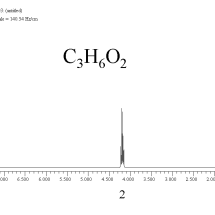 |
| Spektrum 2 | 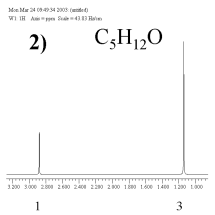 |
| Spektrum 3 | 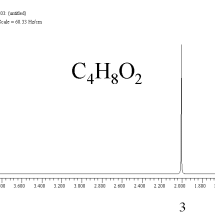 |
| Spektrum 4 | 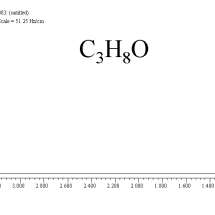 |
| Spektrum 5 | 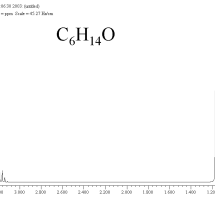 |
| Spektrum 6 | 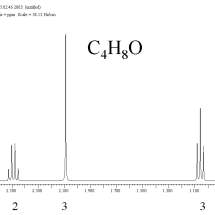 |
| Spektrum 7 | 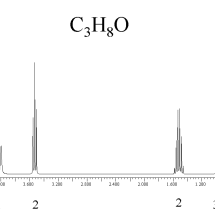 |
|
Spektrum 8 |
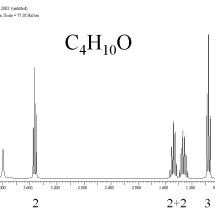 |
| Spektrum 9 | 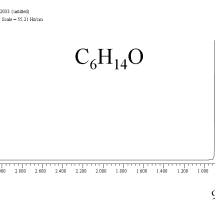 |
| Spektrum 10 | 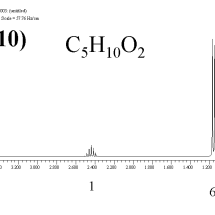 |
| Spektrum 11 | 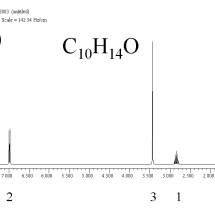 |
| Spektrum 12 | 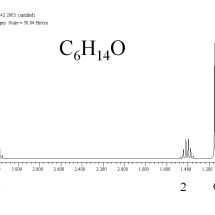 |
| Spektrum 13 | 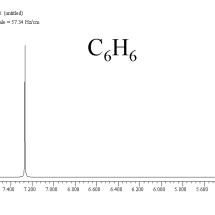 |
| Spektrum 14 | 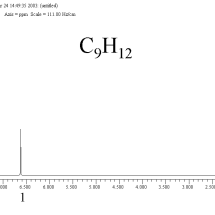 |
| Spektrum 15 | 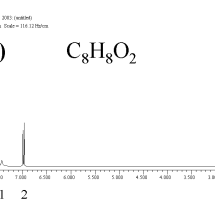 |
| Spektrum 16 | 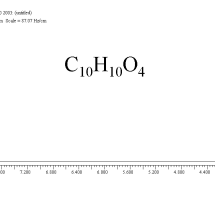 |
Řešení - sumární/strukturní vzorce
[iduzel] => 48903 [canonical_url] => _clone_ [skupina_www] => Array ( ) [url] => /studies/bachelor_en/cach2_en/nmr_clone_78820 [sablona] => stdClass Object ( [class] => stranka [html] => [css] => [js] => [autonomni] => 1 ) ) [48904] => stdClass Object ( [nazev] => Hmotnostní spektrometrie [seo_title] => MS [seo_desc] => [autor] => Ústav analytické chemie [autor_email] => [obsah] =>Základy interpretace hmotnostních spekter
Pravidla pro interpretaci (PDF soubor)
Spektra (vše v jednom souboru):
- Rozdíl mezi elektronovou a chemickou ionizací stejného analytu
Spektrum1 - Elektrosprej - spektrum sulfamethazinu
Spektrum 2 - Elektrosprej - spektrum lysozimu
Spektrum 3 - Spektra dusíku, oxidu uhelnatého a ethenu (stejná nominální hmotnost)
Spektra 4a - Spektrum s vysokým rozlišením
Spektrum 4b
Spektra k výkladu (ionizace nárazem elektronů):
| alkany | Spektrum 5a | Spektrum 5b | Spektrum 5c | řešení |
| Spektrum 6a | Spektrum 6b | Spektrum 6c | řešení | |
| alkeny | Spektrum 7a | Spektrum 7b | Spektrum 7c | řešení |
| aromáty | Spektrum 8a | Spektrum 8b | Spektrum 8c | řešení |
| alkylaromáty | Spektrum 9a | Spektrum 9b | Spektrum 9c | řešení |
| fluorderiváty | Spektrum 10a | řešení | ||
| chlorderiváty | Spektrum 10b-1 | Spektrum 10b-2 | Spektrum 10b-3 | řešení |
| bromderiváty | Spektrum 10c-1 | Spektrum 10c-2 | Spektrum 10c-3 | řešení |
| alkoholy | Spektrum 11a | Spektrum 11b | Spektrum 11c | řešení |
| Spektrum 11d | Spektrum 11e | řešení | ||
| aminy | Spektrum 12a | Spektrum 12b | Spektrum 12c | řešení |
| Spektrum 12d |
Spektra k procvičení:
| Spektrum A | Spektrum B | Spektrum C | |
| Spektrum D | Spektrum E | Spektrum F | řešení |
Na základě interpretace určete hlavní funkční skupiny:
| Alkany: | 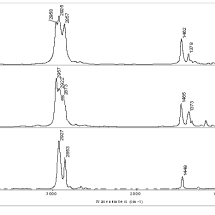 |
| Alkoholy: | 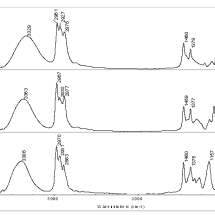 |
| Fenoly: | 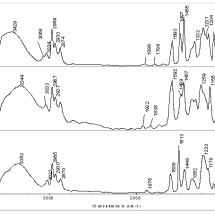 |
|
Vybrané látky obsahující C=O: |
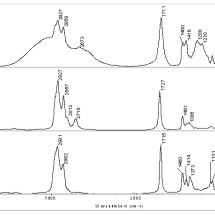 |
| Další spektra: | 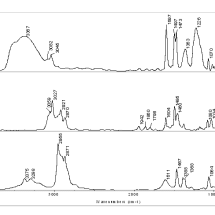 |
| Další spektra: | 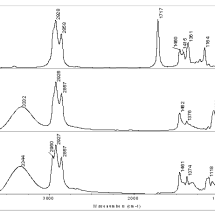 |
Další spektra k procvičování (server UIC)
| Látka 1 | 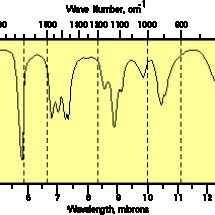 |
| Látka 2 | 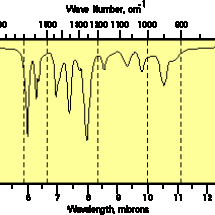 |
| Látka 3 | 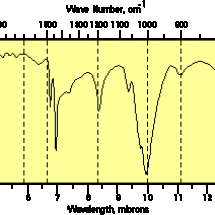 |
|
Látka 4 |
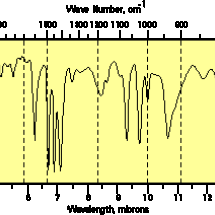 |
| Látka 5 | 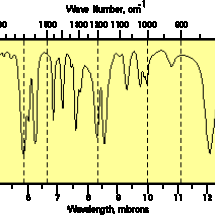 |
| Látka 6 | 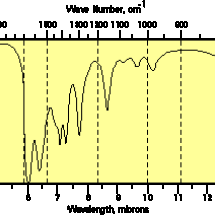 |
| Látka 7 | 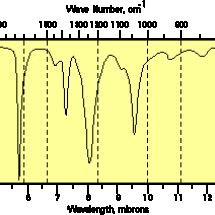 |
| Látka 8 | 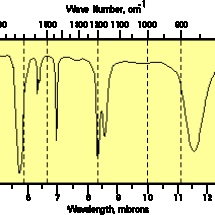 |
| Látka 9 | 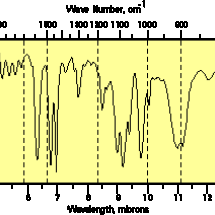 |
| Látka 10 | 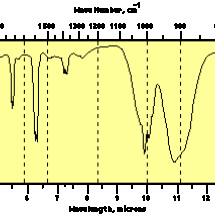 |
Locations - Building A
| laboratory | door number | floor | corridor |
| A | 229 | 2nd | main |
| B | 228 | 2nd | main |
| C | 227 | 2nd | main |
| D | N04 | 2nd | transverse N |
| E | N02 | 2nd | transverse N |
| G | H02 | ground | transverse H |
| L04 | L04 | 2nd | transverse L |
Look around and find the location in advance, late arrivals to labs can´t be accepted.
[urlnadstranka] => [obrazek] => [poduzel] => stdClass Object ( [48907] => stdClass Object ( [nazev] => Laboratories of Analytical Chemistry I [seo_title] => LACH I. [seo_desc] => [autor] => [autor_email] => [obsah] =>This subject consists of seven laboratory tasks, seven laboratory days (from 8 a.m. to 5 p.m.). For each laboratory task, you must study instructions to be able to pass the introduction test, 3 of 6 test questions must be answered correctly.
The protocol (report) must be sent to the teacher no later than 3 days after laboratory work.
The laboratories take place on Wednesdays. Students can choose between two courses – in the first (18.9. – 30.10. 2019) or the second (6.11. – 18.12. 2019) half of the semester. Students must contact Dr. Magda Vosmanská (Magda.Vosmanska@vscht.cz) before the beginning of the semester, no later than 12th September 2019).
The opening of laboratories is on the 1st day of new course and takes place at 8 am in lab D.
- For more information, contact Dr. Magda Vosmanská or go to Student Information System (SIS).
- General Rules
- List of Laboratory Tasks with lab instructions - Students are obliged to obtain these lab instructions.
- Locations of laboratories
- At the beginning of every lab task, students must pass the entance test - Test Rules.
For more information about subject see Analytical Chemistry: Laboratory I
[urlnadstranka] => [obrazek] => [iduzel] => 48907 [canonical_url] => [skupina_www] => Array ( ) [url] => /studies/bachelor_en/laboratories_en/lachi_en [sablona] => stdClass Object ( [class] => stranka_submenu [html] => [css] => [js] => [autonomni] => 1 ) ) [48908] => stdClass Object ( [nazev] => Analytical Chemistry: Laboratory II [seo_title] => LACH II. [seo_desc] => [autor] => [autor_email] => [obsah] =>Analytical Chemistry: Laboratory II
Fluorescence spectroscopy,
Near-infrared spectroscopy,
Raman spectroscopy
and in situ analytical techniques*
* Practical in situ measurement will take place in the natural auriferous mine. In the case of diagnosed claustrophobia, discuss the possibilities with head of LACH II
Each issue, including the first one, will start with the 5-minutes 5-question entry test to verify student readiness for this issue. Minimum of 3 questions must be correctly answered to be allowed to work. The failure in the entrance test implies the mark "F" and the issue have to be recompensed in alternative date
Preliminary time schedule: -- NOT SCHEDULED --
- All necessary informations, including manuals for individual issues, will be provided by head of LACH II - Martin Clupek, Ph.D. (building A, 1st floor, Room A-K05, Martin.Clupek@vscht.cz)
- don't hesitate to contact me